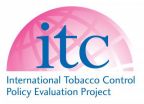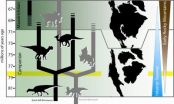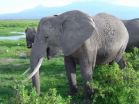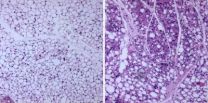(Press-News.org) Professors Lisa Schwartz and Steven Woloshin of the Center for Medicine and the Media at The Dartmouth Institute for Health Policy and Clinical Practice argue that last year's breast cancer awareness month campaign by Susan G Komen for the Cure "overstates the benefit of mammography and ignores harms altogether."
Their views are published on bmj.com today as part of an occasional series highlighting the exaggerations, distortions, and selective reporting that make some news stories, advertising, and medical journal articles "not so."
A growing and increasingly accepted body of evidence shows that although screening may reduce a woman's chance of dying from breast cancer by a small amount, it also causes major harms, say the authors. Yet Komen's public advertising campaign gives women no sense that screening is a close call.
Instead it states that the key to surviving breast cancer is for women to get screened because "early detection saves lives. The 5-year survival rate for breast cancer when caught early is 98%. When it's not? 23%."
This benefit of mammography looks so big that it is hard to imagine why any woman would forgo screening. But the authors explain that comparing survival between screened and unscreened women is "hopelessly biased."
For example, imagine a group of 100 women who received diagnoses of breast cancer because they felt a breast lump at age 67, all of whom die at age 70. Five year survival for this group is 0%. Now imagine the women were screened, given their diagnosis three years earlier, at age 64, but still die at age 70. Five year survival is now 100%, even though no one lived a second longer.
Overdiagnosis (the detection of cancers that will not kill or even cause symptoms during a patient's lifetime) also distorts survival statistics because the numbers now include people who have a diagnosis of cancer but who, by definition, survive the cancer, the authors add.
"If there were an Oscar for misleading statistics, using survival statistics to judge the benefit of screening would win a lifetime achievement award hands down," they write.
But that doesn't stop people from misinterpreting survival statistics. Disturbingly, in a recent survey, the authors found that most US primary care doctors also mistakenly interpret improved survival as evidence that screening saves lives.
Mammography certainly sounds better when stated in terms of improving five year survival - from 23% to 98%, a difference of 75 percentage points, they say. But in terms of its actual benefit, mammography can reduce the chance that a woman in her 50s will die from breast cancer over the next 10 years from 0.53% to 0.46%, a difference of 0.07 percentage points.
The Komen advertisement also ignores the harms of screening, they add. For every life saved by mammography, around two to 10 women are overdiagnosed. These women cannot benefit from unnecessary chemotherapy, radiation, or surgery. All they do experience is harm.
"Women need much more than marketing slogans about screening: they need - and deserve - the facts," conclude the authors. "The Komen advertisement campaign failed to provide the facts. Worse, it undermined decision making by misusing statistics to generate false hope about the benefit of mammography screening. That kind of behaviour is not very charitable."
### END
Breast cancer charity under fire for overstating the benefits of screening
Experts challenge 'pink ribbon' creator for misusing statistics to generate false hope
2012-08-03
ELSE PRESS RELEASES FROM THIS DATE:
5-year survey confirms Uruguay's world-leading tobacco control strategy is delivering results
2012-08-03
Implementation of graphic labels at 80% of the pack size front and back led to increased awareness of the risks of smoking
Ban on multiple brand presentations reduced smokers' false beliefs that some cigarettes (e.g., "light" or "mild" cigarettes) are less harmful
Strong support for tobacco control policies among smokers
(Thursday August 2nd, 2012, Montevideo, Uruguay and Waterloo, Ontario, Canada): The International Tobacco Control Policy Evaluation Project (the ITC Project) today launched a new report on the effectiveness of tobacco control policies in Uruguay. ...
Mountains, seaway triggered North American dinosaur surge
2012-08-03
ATHENS, Ohio (Aug. 2, 2012)—The rise of the Rocky Mountains and the appearance of a major seaway that divided North America may have boosted the evolution of new dinosaur species, according to a new Ohio University-led study.
The finding, published today in the journal PLOS ONE, may explain patterns of evolution and migration of North American duck-billed and horned dinosaurs in the years leading up to their extinction 65 million years ago, said Terry Gates, a postdoctoral researcher with Ohio University's Heritage College of Osteopathic Medicine who is lead author on ...
Close to the bone
2012-08-03
A genetic screening approach to studying bone disease has found nine new genes associated with bone health and suggests a new way to discover genes that may be implicated in human skeletal diseases. A collaborative study of the mineral content, strength and flexibility of bones has found clues to the cause of bone disorders such as osteoporosis, osteogenesis imperfecta, and high bone density syndromes. The study, which brings together specialist skills in mouse gene deletion and bone measurement to assess the strength of bones in 100 mutant mouse lines, is the largest ...
Modest weight loss can have lasting health benefits, research shows
2012-08-03
ORLANDO, Fla. – Overweight and obese individuals can achieve a decade's worth of important health benefits by losing just 20 pounds, even if they regain the weight later that decade, according to research presented at the American Psychological Association's 120th Annual Convention. With a focus on psychology's role in overcoming the national obesity epidemic, the session also examined research that indicates foods high in sugar and fat could have addictive properties.
Rena Wing, PhD, professor of psychiatry and human behavior at Brown University's Alpert Medical School ...
Study shows how elephants produce their deep 'voices'
2012-08-03
African elephants are known to be great communicators that converse with extremely low-pitched vocalizations, known as infrasounds, over a distance of miles. These infrasounds occupy a very low frequency range—fewer than 20 Hertz, or cycles, per second—that is generally below the threshold of human hearing.
Now, a new study shows that elephants rely on the same mechanism that produces speech in humans (and the vocalizations of many other mammals) to hit those extremely low notes. Christian Herbst from the University of Vienna, along with colleagues from Germany, Austria ...
NASA satellites see Tropical Storm Saola and Typhoon Damrey arm-in-arm near China
2012-08-03
Tropical Storm Saola and Typhoon Damrey appear on NASA satellite imagery to be arm-in-arm as they enter China on August 2.
NASA's Terra satellite passed over both tropical cyclones and captured them in one image, using the Moderate Resolution Imaging Spectroradiometer (MODIS) instrument onboard. MODIS captured a visible image on August 2, 2012 at 0245 UTC that showed the southern extent (or arm) of Typhoon Damrey, making landfall north of Shanghai, feeding into the northern extent (or arm) of Tropical Storm Saola, making landfall south of Shanghai. MODIS imagery also ...
Bacteria-immune system 'fight' can lead to chronic diseases, study suggests
2012-08-03
ATLANTA – Results from a study conducted at Georgia State University suggest that a "fight" between bacteria normally living in the intestines and the immune system, kicked off by another type of bacteria, may be linked to two types of chronic disease.
The study suggests that the "fight" continues after the instigator bacteria have been cleared by the body, according to Andrew Gewirtz, professor of biology at the GSU Center for Inflammation, Immunity and Infection. That fight can result in metabolic syndrome, an important factor in obesity, or inflammatory bowel disease ...
Research could lead to improved oil recovery, better environmental cleanup
2012-08-03
CORVALLIS, Ore. – Researchers have taken a new look at an old, but seldom-used technique developed by the petroleum industry to recover oil, and learned more about why it works, how it could be improved, and how it might be able to make a comeback not only in oil recovery but also environmental cleanup.
The technology, called "microbial enhanced oil recovery," was first developed decades ago, but oil drillers largely lost interest in it due to its cost, inconsistent results and a poor understanding of what was actually happening underground.
The new findings by engineers ...
New target for treating diabetes and obesity
2012-08-03
AUDIO:
Researchers at Washington University School of Medicine in St. Louis have identified a potential target for treating diabetes and obesity. They discovered that when a particular protein is disabled in...
Click here for more information.
Researchers at Washington University School of Medicine in St. Louis have identified a potential target for treating diabetes and obesity.
Studying mice, they found that when the target protein was disabled, the animals became more ...
Judging the role of religion in law
2012-08-03
There's a passage in the Old Testament's Deuteronomy that says if a case too difficult to decide comes before the courts, it should be brought to the Levite priests who will render a verdict in God's name. However, one University of Alberta researcher says that may be taking religious freedom a step too far.
Sarah Hamill, a doctoral student in the Faculty of Law, recently published an article in response to a premise that said judges who lack direction-setting precedence in cases should use religious-based reasoning. Hamill contends that—aside from being a serious breach ...
LAST 30 PRESS RELEASES:
Science reveals why you can’t resist a snack – even when you’re full
Kidney cancer study finds belzutifan plus pembrolizumab post-surgery helps patients at high risk for relapse stay cancer-free longer
Alkali cation effects in electrochemical carbon dioxide reduction
Test platforms for charging wireless cars now fit on a bench
$3 million NIH grant funds national study of Medicare Advantage’s benefit expansion into social supports
Amplified Sciences achieves CAP accreditation for cutting-edge diagnostic lab
Fred Hutch announces 12 recipients of the annual Harold M. Weintraub Graduate Student Award
Native forest litter helps rebuild soil life in post-mining landscapes
Mountain soils in arid regions may emit more greenhouse gas as climate shifts, new study finds
Pairing biochar with other soil amendments could unlock stronger gains in soil health
Why do we get a skip in our step when we’re happy? Thank dopamine
UC Irvine scientists uncover cellular mechanism behind muscle repair
Platform to map living brain noninvasively takes next big step
Stress-testing the Cascadia Subduction Zone reveals variability that could impact how earthquakes spread
We may be underestimating the true carbon cost of northern wildfires
Blood test predicts which bladder cancer patients may safely skip surgery
Kennesaw State's Vijay Anand honored as National Academy of Inventors Senior Member
Recovery from whaling reveals the role of age in Humpback reproduction
Can the canny tick help prevent disease like MS and cancer?
Newcomer children show lower rates of emergency department use for non‑urgent conditions, study finds
Cognitive and neuropsychiatric function in former American football players
From trash to climate tech: rubber gloves find new life as carbon capturers materials
A step towards needed treatments for hantaviruses in new molecular map
Boys are more motivated, while girls are more compassionate?
Study identifies opposing roles for IL6 and IL6R in long-term mortality
AI accurately spots medical disorder from privacy-conscious hand images
Transient Pauli blocking for broadband ultrafast optical switching
Political polarization can spur CO2 emissions, stymie climate action
Researchers develop new strategy for improving inverted perovskite solar cells
Yes! The role of YAP and CTGF as potential therapeutic targets for preventing severe liver disease
[Press-News.org] Breast cancer charity under fire for overstating the benefits of screeningExperts challenge 'pink ribbon' creator for misusing statistics to generate false hope




